Text © 2012
On February 5th, Felice Sgarra, a Pugliese from Andria, was in Milan to participate in Identità Vent’anni, a day dedicated to chefs who are not yet 30 years old. He just made it under the wire because the next day was his 30th birthday and that of his twin brother Riccardo, who is a sommelier.
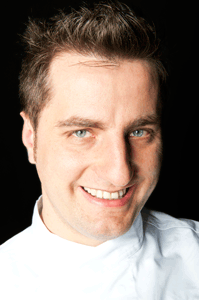
Felice graduated from the hotel school in Roccaraso in the Abruzzi. His best friend there was William Zonfa who is now the starred chef at “Mangione Papale” in L’Aquila, but for several years this pair had worked side-by-side at “Vinalia,” also in L’Aquila. After the devastating earthquake there three years ago, Felice decided to return home to Andria. From December 2009 to December 2010 he was the Executive Chef of the restaurant “Le Lampare al Fortino” in nearby Trani. His life changed dramatically in February 2011 when he became the Executive Chef and partner of his restaurant “Umami.” Lucy Gordan, the Rome Bureau-Chief of Epicurean-Traveler.com, met him first in December 2011 in Andria at QOCO/un filo d’olio nel piatto, an international culinary event featuring the local olive oil cultivar “Coratina,” and then again at IdentitàGolose in February 2012.
Our tastes in food are closely connected to our childhood; what are your first memories of food?
FS: My first memories of food are of milk and of the smells and aromas of my beloved Puglia: of the tomato preserves we make in August and of the almond biscuits at Christmastime.
How was your love of cooking born?
FS: Watching my grandmother make orecchiette on her wooden pastry board and going with my grandfather to the olive-press to crush his olives into olive oil.
Are there other chefs in your family?
FS: My mother and my grandmothers, all unbeatable chefs.
Who were your mentors and what did you learn from them?
FS: My mentors were Michele Memeo, Peppino D’Introno, and Pietro Zito, before he opened “Antichi Sapori,” when I worked at the “Ostello di Federico II” near Castel del Monte. Afterwards there have also been many others. From each one I learned a technique, a secret, or a skill. I’m talking about the years 1993, 1994, and 1995, when my ideas were only ambitious goals and I still didn’t understand what I really needed to accomplish.
Your restaurant is called “Umami”; what does that mean?
FS: Umami is the fifth flavor. It was discovered a century or so ago by Ikeda while he was doing research on seaweed. The fifth flavor, the glutamate, the tangy sensation we feel on our palate, on our tongue, is well coded. We have sweet, bitter, sour and salty. The fifth sensation or taste is “umami.” It’s a taste that we seldom can pinpoint, exactly describe. We find it in parmesan and in soy. It was defined as the fifth flavor or taste in 1982, the year I was born. I chose this name for a philosophy of innovation and as part of the tradition that exists in rediscovery.
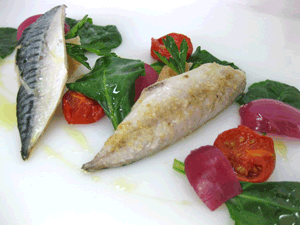
“Umami” is located in the city of Andria in Puglia; what are the challenges you faced opening a restaurant of high-quality cuisine in southern Italy? How did you overcome them?
FS: It means having a heart, not a top-quality restaurant. I put my heart and soul into my work; that’s my secret ingredient. I define myself as a cook and I’m searching to create contemporary, up-to-date tradition. The difficulty is to remain obstinate and directed enough to take a courageous stand towards one’s culinary philosophy, and therefore not to get discouraged, to give up, to throw in the towel. Top-quality cuisine for me means a restaurant with culture where the dishes create an emotion through genuine flavors. Therefore the difficulty lies in giving, transmitting culture, deep inner reflections that have to be understood and felt.
What message do you want to convey through your cooking?
FS: The message is important: in Andria there’s a kitchen run by Felice Sgarra, where all the ingredients come from this area of Puglia so they are part of me; they belong to the inner reaches of my soul; they’re part of my DNA; I feel them always. This vital lymph is the secret of a philosophy with no ending; it’s only in evolution in my head and goes beyond my very imagination.
We first met last December in Andria during “Qoco/Un filo d’Olio nel Piatto,” an international event where local olive oil was the featured ingredient. It was a home game for you. Then we met again at “IdentitàGolose,” another international event, but in Milan. Do you remember the menu you served the evening we came to “Umami” during Qoco and the dishes you presented at IdentitàGolose?
FS: At “Umami” as the first course you ate my horsemeat “Andrian hamburger” filled with Andrian burrata, a cream of vetch, which is a kind of fodder, with little strips of rocket bread, orecchiette made of roasted wheat, with turnip tops and seasoned ricotta and creamed ricotta. The main dish was suckling pig with wild beet leaves. A pre-dessert was tangerine sherbet. The dessert was a warm quince cake. At Qoco I presented a millefoglie made with olive oil and potato and ricotta mousse. At IdentitàGolose I presented spaghettone made with taralli flour with a cream of cristauri, which is a wild herb from the Murgia, and tiny tomatoes from Torre Guaceto. The theme was entitled: The ingredient’s courage, altruism, and fantasy.
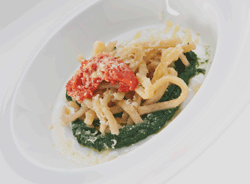 Spaghettone di taralli with cream of cristauri |
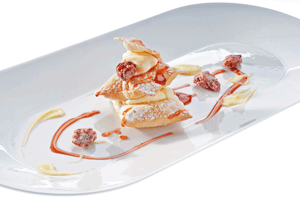 Millefoglie with olive oil and potato & ricotta mousse |
What are the essential qualities of a top chef?
FS: They don’t really exist for me. Maybe to be a top chef you need to make space in your mind, give an identity to a flavor, a taste, which then everyone all over the world will talk about, like Aimo and Nadia’s spaghettone al cipolotto or Massimo Bottura’s siphoned mortadella. According to me we are all top chefs. I feel it inside of me, but I need a lot of time to get there. It’s important to work at it heart and soul.
What do you like best about your work?
FS: What I like best about my work is talking to my guests at the end of their meal and hearing what they felt about it, their emotions. I like to look straight into their eyes and see if they are shining. If so, my heartbeats reach 1,000 per minute; it’s an indescribable emotion.
The least?
FS: Negative criticism because it offends and hurts me to the core. It’s devastating, but I well understand two aspects. Criticism forms us, but very often we don’t understand something: that we can overcome human error. The only thing I know for certain is that I don’t know everything. Even when I receive a negative judgment, review, comment, it makes me happy because I’ve learned something.
What’s your culinary philosophy?
FS: My philosophy is the possibility of being, of giving, and of opening myself up. Open-mindedness without concealing secrets. Secrets don’t exist in the kitchen. Dexterity exists and that should be appreciated. So my philosophy is a love and cult of research, that I must never stop because of my need to evolve.
In a nutshell, how would you define your cuisine?
FS: My cuisine wants to be forward-looking in the opposite sense, that is traditional. The tradition is to bring out the flavors of the ingredients with a view towards innovation, but remembering my grandmothers, I want to define my cuisine as contemporary, too, without grand pretences, simple and basic. That’s my cuisine.
What are your signature dish and other specialties?
FS: I haven’t determined my specialties yet; everything is still special for me. For me the ingredients make a dish special.
What do you believe is the reason for your success?
FS: I don’t know the reason for my success because it’s not success per se, but rather an enormous desire to achieve, to follow my heart, my instincts, my culinary spirit, working in my kitchen. For me the most successful chefs are the big names like the Cerea brothers, Massimo Bottura, Niko Romito, Annie Feolde, I Santini, Uliassi, and Moreno.
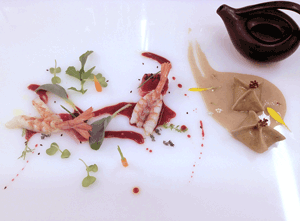
Up to now you’ve told me about Felice Sgarra the chef; I’d like to know more about Felice Sgarra himself. For example, what are your favorite foods?
FS: Felice Sgarra is not a chef. He’s a cook, an artisan of his ingredients. I don’t like to be defined as a chef, not out of humility, but because I think of myself as a cook who cooks with his “boys,” his team. I don’t have favorite foods, but there are ingredients I love. I grow them. I smell their aromas. I taste them and I cook them. So Felice Sgarra is driven by an innate passion. He’s in continuous evolution, always with great humility and with his secret ingredient: his heart.
A dish you dislike?
FS: I can’t think of a single dish that I don’t like. My mother tells me it’s pasta with ricotta. It depends if it’s well or badly prepared. The dish I dislike is the one that’s badly prepared without enthusiasm.
Your favorite wines?
FS: My favorite wines are red: “Il Primitivo” from Manduria, “Nero di Troia” and “Negramaro.” Depending on my mood, I prefer bubbles and fruity white wines like “Friulano” and “Riesling.”
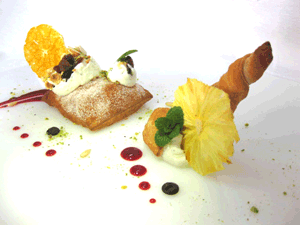
Chefs are well-known for having collections, often of motorcycles, fast cars, or watches; what about you?
FS: I like everything that has class, is in good taste. My twin brother Riccardo and my other brother Roberto and I are all caught up in the whirlpool of fancy watches. We each have a Rolex “Ghieraverde.” Let’s say I’m multi-faceted when it comes to good taste and beautiful things. I love boats, custom-made clothes, beautiful architecture and all things connected to it, everything that is simple and in good taste, in other words luxury without vulgarity.
What are your hobbies?
FS: I like to travel, to take two or three days off and go to lunch or dinner at a great restaurant and to be able to reflect on the meal and understand my opinion of it.
Your feelings about food critics and restaurant guides; have they been helpful to you or do they add stress?
FS: I approve of guides because they publicize but also keep us on our toes. Success or lack of it doesn’t come from a guide’s good or bad review. It goes from the heart and soul, the good humor and smile that you put into your work. A word of advice: yes, it’s important to prepare good food and make your guests eat well, but you have to believe in yourself, you must have faith because besides your food there are also little snuggles, cuddles, special attention that make your guests feel good.
Other chefs you admire?
FS: I admire many great chefs because I respect them. They are great masters. For examples, Heinz Beck, Gualtiero Marchesi, Cerea, Niko Romito, Gennaro Esposito, Uliassi, Enrico Crippa, Moreno Cedroni, Ferran Adria, Cracco. There are many great chefs, and each one of them has a special characteristic, talent that represents his greatness, that will remain in the history of cooking and gastronomy. I admire one in particular: Pietro Zito because he, like me, does not define himself as a chef. Maybe it’s only a coincidence, but our restaurants are only 5 miles apart. I admire his simplicity, his love of the soil. I also admire Sebastiano Lombardi for his deep humility and close friendship.
If they hadn’t become chefs, Heinz Beck told me he had wanted to be a painter, Marchesi a pianist; Thomas Keller the short-stop for the New York Yankees. What about you?
FS: I would have liked to be an architect. I would have put my heart and soul into this profession too, which today is suffering from the worldwide economic crisis. The only solution is to keep going, look to the future, lower your head in humility and hurry up and work.
& & &
